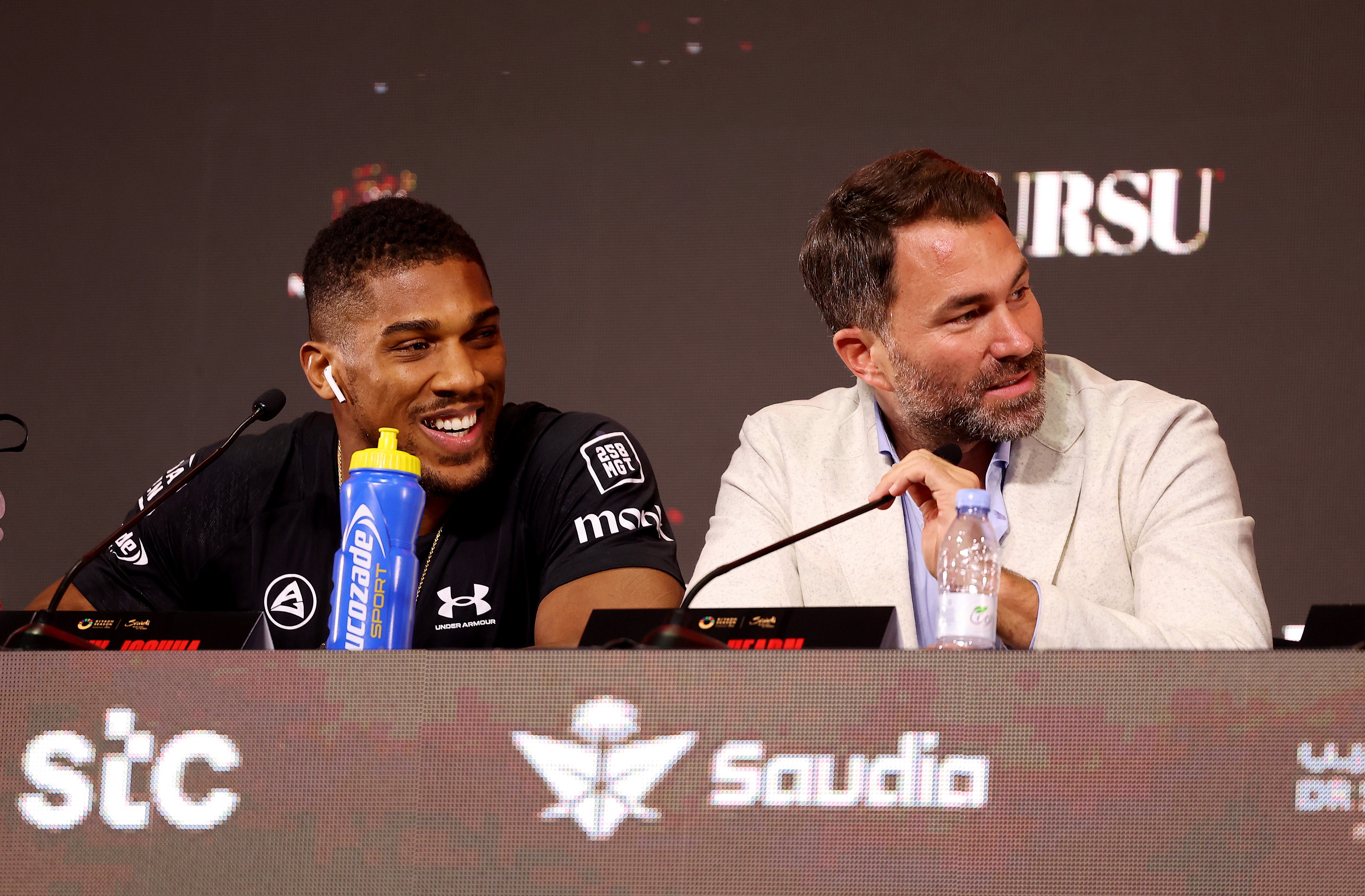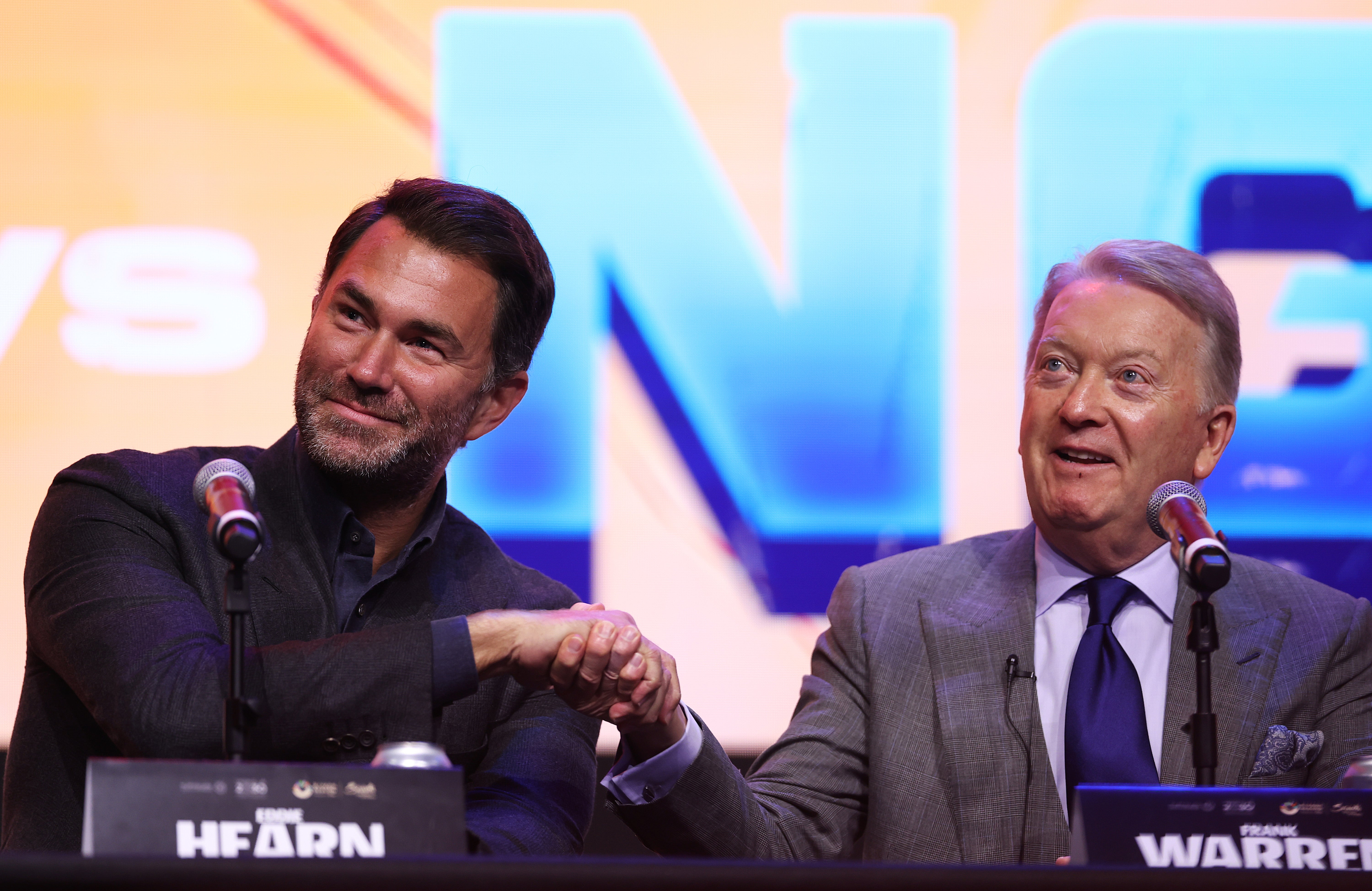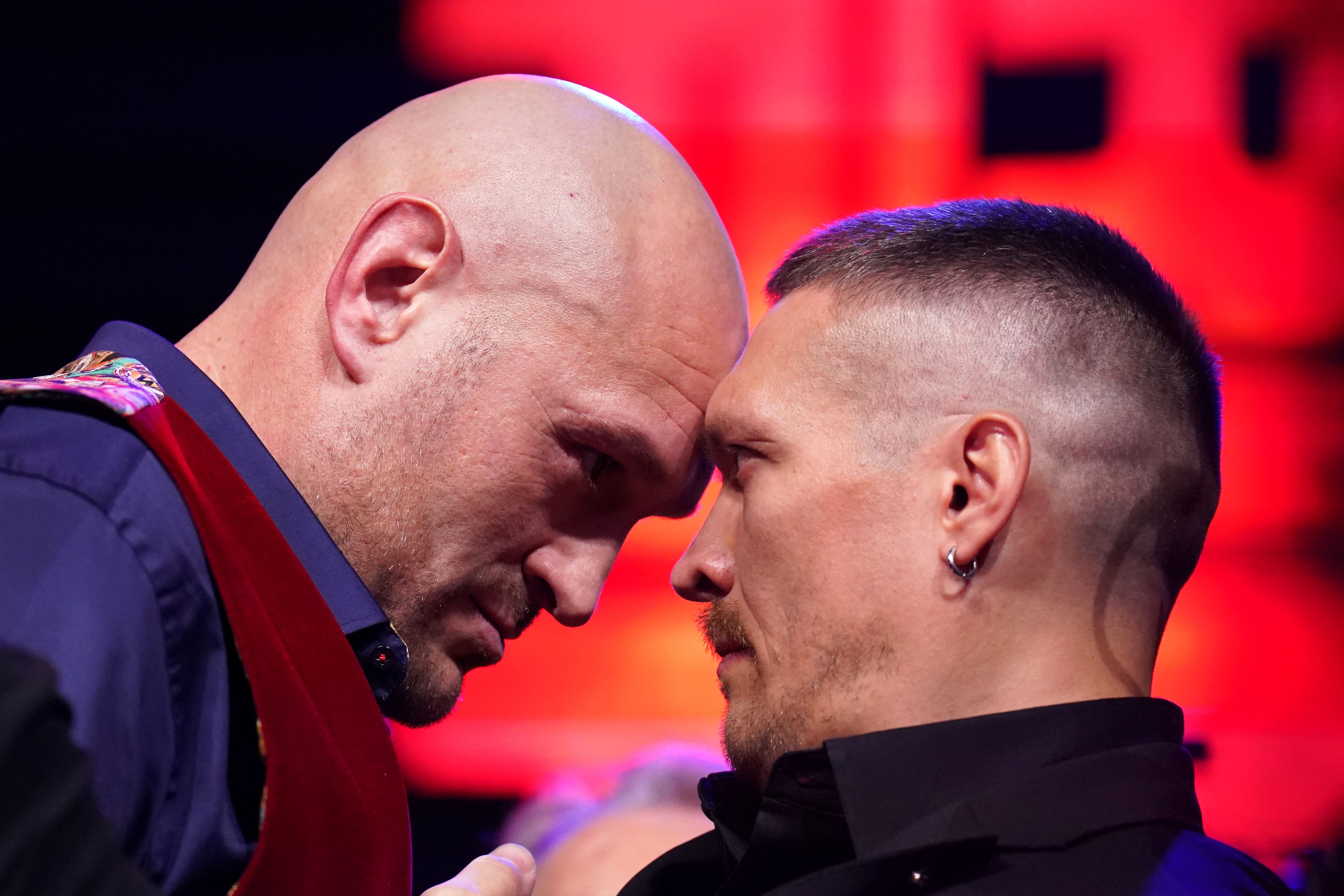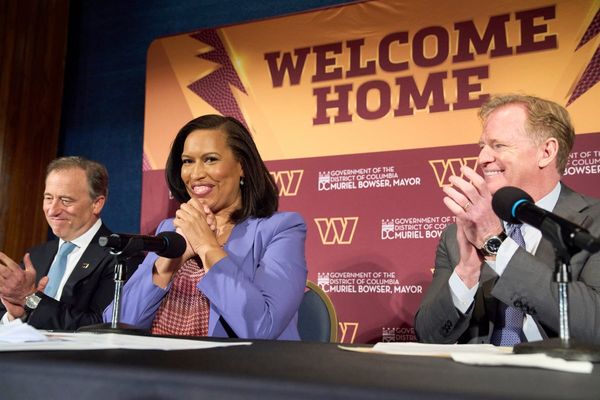
What is the main misconception among boxing fans, when they think about how fights are made? It is not a rhetorical question. Rather, it is one put to Eddie Hearn, Frank Warren, Ben Shalom and Frank Smith by The Independent, because for years, the predominant issue plaguing this form of pugilism has been a lack of big fights.
There are, of course, other issues, but fans’ main focus has always been on seeing the best fighters face their contemporaries, and that has frankly not happened enough in recent times. That dynamic is admittedly changing, with an injection of Saudi money taking rapid effect in the bloodstream of boxing, but even so, there are a few things that the sport’s most influential promoters would like to make clear.
So, what is the main misconception among boxing fans, when they think about how fights are made?
“That you just ring a fighter and go, ‘This is the date, this is your money, see you there,’” laughs Frank Smith, CEO of Matchroom Boxing. “I think fans don’t really understand the politics behind it, the arguments. ‘Well, I deserve this much if that person is getting that.’”
Smith, 31, is a powerful partner of Hearn – chair of Matchroom Sport, son of Barry Hearn – as they work on events involving Anthony Joshua, Saul “Canelo” Alvarez and more of boxing’s top stars. The Essex duo are aligned on many topics, particularly fighter negotiations. While boxing is an “ego-driven sport”, as Smith says, the “numbers don’t lie”, according to Hearn.
“Something hard for us is the fighters’ perception of their value,” says Hearn, 44. “There’s a mathematical system that tells us the value in a fight: ticket sales, pay-per-views, subscriptions, TV rights, sponsorship. It’s very easy to put a budget together. That’s the number for the fight, it’s not double that!” Smith concurs: “It’s a hard conversation to have, but when you can paint a picture with numbers that are easy to see, it’s hard to argue with.”

Fighters presumably don’t like hearing that their value is not what they perceive it to be, I suggest. “A lot of fighters need the right opponent, and sometimes that’s hard for them to take,” Smith acknowledges. “Very few fighters in the world can demand significant money when people aren’t really interested in the opponent. You’re looking at the likes of ‘AJ’, Canelo, Floyd Mayweather.
“Fighters look at it like giving up money. They may think 50-50 is an unfair split, but the reality is: that’s the only way that fight is made and you make a lot of money. Are you making more than you’ve ever made in a fight? If you didn’t hear what he’s getting, would you be happy with what you’re getting? They’d say yes, 99 per cent of the time.”
The “crazy thing”, to Hearn, is that some figures may be prepared to overpay, inflating a fighter’s sense of monetary worth. “A new broadcaster comes in, an investor... These fighters deserve as much money as they can get, and if they can get it elsewhere, good luck to them! But if my budget says this fighter’s worth $500,000 in this fight, and he wants $1m, I can’t just say: ‘No problem.’ You’ve seen with Showtime recently, once you start doing that, the business doesn’t work.”
Hearn is referring to Showtime’s withdrawal from boxing after its 37 years broadcasting the sport. The move in December led Showtime’s partner promotion, PBC, to sign a deal with Amazon Prime. “As much as we have to deliver for our fighters, we’re also a business that has to run profitably,” Smith says. “A lot of people come into the sport, lose a fortune over a couple of years, then disappear.”

Another issue is that egos don’t just relate to finance. That has frustrated Warren across five decades in boxing, as the man behind Queensberry Promotions – and the man behind Tyson Fury since his remarkable comeback in 2016. “Sometimes fighters argue about who’s gonna walk out first on the night or on the scales,” the 72-year-old says. “I can’t tell you how boring and tedious it is. For me, the easiest way would be to toss a coin, but even getting them to do that... ‘Who’s gonna toss the coin?!’ It’s so stupid.”
Smith echoes the sentiment: “Once you get past the money, it’s: ‘I want this changing room, this ring size, my name here, my picture on this side of the poster.’ To me, that’s all a load of rubbish. If you’re happy with what you’re getting paid, don’t worry about where you are on the poster – go in there, have a tear-up, and win the fight.”
Furthermore, fighters’ egos and interests aren’t the only ones at the negotiating table. “We want to make the biggest fights out there,” Hearn insists. “We make our money from big fights and good fights, but one of the problems is that we’re negotiating with managers, trainers and advisers, some of which know nothing and most of which want the easiest fight for the biggest money. We need to change the format a little, we need to be stricter with fighters. We’ve still got to manage their career in the right way, but it should be more like: ‘This is the fight for you.’”
Shalom, who founded Boxxer in his 20s and remains the promotion’s CEO at the age of 30, offers a different perspective. “It’s usually not the fighters that make it difficult,” he argues. “It’s very rare for a fight not to happen if two fighters want it, unless there are circumstances with regulations or this and that.”

Warren, though, has experienced the opposite at times. “I’m not gonna name names, but people can call each other out and say they want these fights, and then it doesn’t happen,” he says. “There are ways they can get out of fights: They can say they don’t want it – and most of them won’t say that – or they can price themselves out of it, where it becomes uneconomical.”
At this point, Shalom identifies another factor that can thwart the realisation of a big fight. “There’s so much pressure on promoters to compete with each other,” he says. “Broadcasters are in competition as well, so the promoters have to deliver for them. It really holds the sport back. It’s so much easier if you’ve got a good relationship with other promoters, ie: us with Top Rank. The less that promoters can be seen as rivals, the more we’ll see the best fights.”
Shalom suggests that the issue could be solved by “strong governance”: “It used to be that promoters couldn’t go on the same night; the board would impose that. That can’t happen anymore, but what a strong board could do is have regular meetings with major promoters, where they discuss their problems, which fights could be made, how they’re not gonna clash. Effectively policing the sport, that’s what other sports have; that’s how they thrive.”
Yet another solution has already arisen: the aforementioned Saudi money. The Gulf state’s bid to diversify its income streams has seen it invest heavily – and rapidly – in boxing. The sheer amount of money on the table has forced Hearn and Warren – and other promoters – to go from bitter rivals to boxing bedfellows.

Together, Matchroom and Queensberry presented an unprecedented fight card in Riyadh in December, as Joshua and Deontay Wilder fought on the same night. That was followed by Joshua’s win over ex-UFC champion Francis Ngannou in March, in the same city, while a Matchroom vs Queensberry event is scheduled for June. Yet even that is a sign of cooperation as much as it is a sign of rivalry. Of course, the centrepiece for the Saudis, guided by adviser Turki Al-Sheikh, is this weekend’s clash between Fury and Oleksandr Usyk, which will crown the first undisputed heavyweight champion in 24 years.
These events are seismic for TNT Sports – Queensberry’s broadcaster in the UK – and DAZN – Matchroom’s broadcaster – but Boxxer and Sky Sports have mostly been left out in the cold, while their rivals bask in the warm, sunny rays of Riyadh. That said, Sky will get a slice of the monetary pie when Fury faces Usyk, with the broadcaster joining TNT and DAZN in airing the historic event. “In Saudi, they want to put it out everywhere,” Warren says.
What Boxxer and Sky have wisely done, in any case, is tap into women’s boxing. That side of the sport is a growing market, and importantly, it often lacks the egos present in men’s boxing. Ahead of her narrow loss to Natasha Jonas in January, former world champion Mikaela Mayer told The Independent: “We have to [take these risks], we don’t have the privilege of sitting back and collecting one big cheque. We still have to prove to a lot of people that we belong in this sport, and that starts with making fights that fans want to see. We’ve got to hustle a little harder [to] have that leverage.” Jonas vs Mayer stands out alongside Mayer’s battle with Alycia Baumgardner, and Claressa Shields’s showdown with Savannah Marshall, as big-name women’s fights that Boxxer has brought to life in recent years.
But when it comes to bringing fights to life, where do promoters even start?

“When there’s a fight being discussed, the first thing that we’ll say is: ‘Put together the budget,’” Hearn explains. “TV revenue, gate receipts, ticket sales, sponsorship – the cost of the show and what we can pay is very simple, very transparent. Then you go to the fighters and start negotiating. You can tell very quickly if you’re wasting your time or not. Then we look at the venue availability, go to DAZN and say, ‘What weeks do you like?’ We marry that up with the venue availability, then we try to get the deals over the line with both camps. That’s the model.”
The process can take days, but it often takes months, Smith reveals. “A good example is Chris Eubank Jr vs Conor Benn,” he says, referencing a bout that collapsed in 2022 – but which is still on the cards. “The first time around, it took about nine weeks to make that fight. Same with Joshua vs Usyk 2, it took months and months. Fights of that magnitude are large-scale events, with significant financial investment from both parties.”
Last autumn, there was an attempt to rebook Eubank Jr vs Benn for 23 December, after it became clear that Fury vs Usyk would not take place on that date. The attempt was unsuccessful – though Joshua and Wilder’s fights did materialise – but Smith highlights some problems that might have occurred anyway: “You’re still only seven or eight weeks away, and you don’t have a deal in place. Once you announce it, you’re five or six weeks out. It doesn’t give you the time to make the most of a fight of that magnitude.”
All the stressful factors in figuring out fight deals are worth it, though, according to Smith. “I love putting on shows,” he smiles. “I love walking out every weekend and seeing 8,000, 10,000, 20,000 people enjoying themselves, and thinking: ‘We did that.’ At the same time, if it isn’t good enough, I like looking at it and saying: ‘We need to improve.’
“We’re lucky that we’re in a business where we do all of it ourselves; everything you see is created by us. I’m lucky that I get to walk out and see the end product. You don’t get that with many jobs anymore; if you’re in a factory, a lot of the time you’re only working on a certain part.”
One event that has remained elusive, but which finally looks likely given the Saudis’ involvement, is Joshua vs Fury. That is also the event that Smith, Hearn and Warren prize the most. “That’d go down in history,” Smith says. “Sometimes fights are bigger than belts, losses, whatever. That’s a fight we have to make before they retire. That’d be one I’d look back on and go: ‘I’m glad we got it over the line.’ I’d love to be a part of an event of that magnitude, and I’m confident as well. It’s too big not to happen.”
Previously fights would have been too big to happen. Not anymore.







